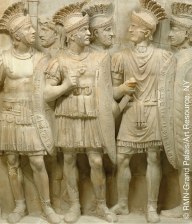In the Apocolocyntosis, it is mentioned that the deceased Claudius encounters Hercules, the heroically strong son of Jupiter. The god is sent to meet him because, since he had traveled widely about the world as a mortal, he is quite possibly the best one to figure out what sort of man Claudius was, since his continually twitching head, lame right foot, and unintelligible speak confused all the other gods.
This may seem like an insulting exaggeration of minor physical habits, but is actually, in fact, a fairly accurate description of the man. Claudius really had all these afflictions: his head would twitch uncontrollably; he walked with a limp, one of his feet being lame; his grip was noticeably weak; his nose would run and he would drool uncontrollably when excited; he was partly deaf, apparently from an early-childhood illness; and he had a severe speech impediment, his voice stuttering and speech otherwise confusing to hear. He was born with most of these infirmities (in fact, his name derives from the Latin adjective claudus, meaning ‘lame, crippled, and/or defective’), with the rest developing as he grew up, and seemed to worsen whenever he was agitated. Many modern scholars have attempted to diagnose his conditions, referring to his afflictions as cerebral palsy and infantile paralysis (among others), but no one knows for certain.

At the best of times, Claudius could control his symptoms, appearing as if he didn’t even have them.
These afflictions kept him out of the public eye for most of his life: his own mother, Antonia, constantly referred to him as a ‘monster,’ and no one seemed to object when she essentially shoved him to the back of the house. She refrained him from being seen at parties, greeting visitors to the house, even going out into public! Only during the reign of Tiberius (Augustus’ successor), long after she’d passed away, did Claudius even attempt to enter the political world; but even then the emperor restricted the offices available to him, apparently harboring reservations similar to what his mother had.
But, despite being kept far from the public, the young Claudius appeared to be quite gifted, surprising anyone who met him with his intelligence. Under the tutoring of several well-respected men (among them the historian Titus Livius (Livy)), he developed an affinity for history, and wrote several historiae (recollections of historical events) as he matured. Even his symptoms, which were apparently quite severe, seemed to lessen as he aged, and Augustus himself was impressed with his improvements. But, even though he’d impressed the Emperor Augustus himself, there were more people who despised him than not, and until he was saluted by the Praetorian guard (‘pr-eye-torian’, not ‘pray-torian’) he was downcast as an imbecilic fool, a deformed monstrosity despised by many and liked by few.
